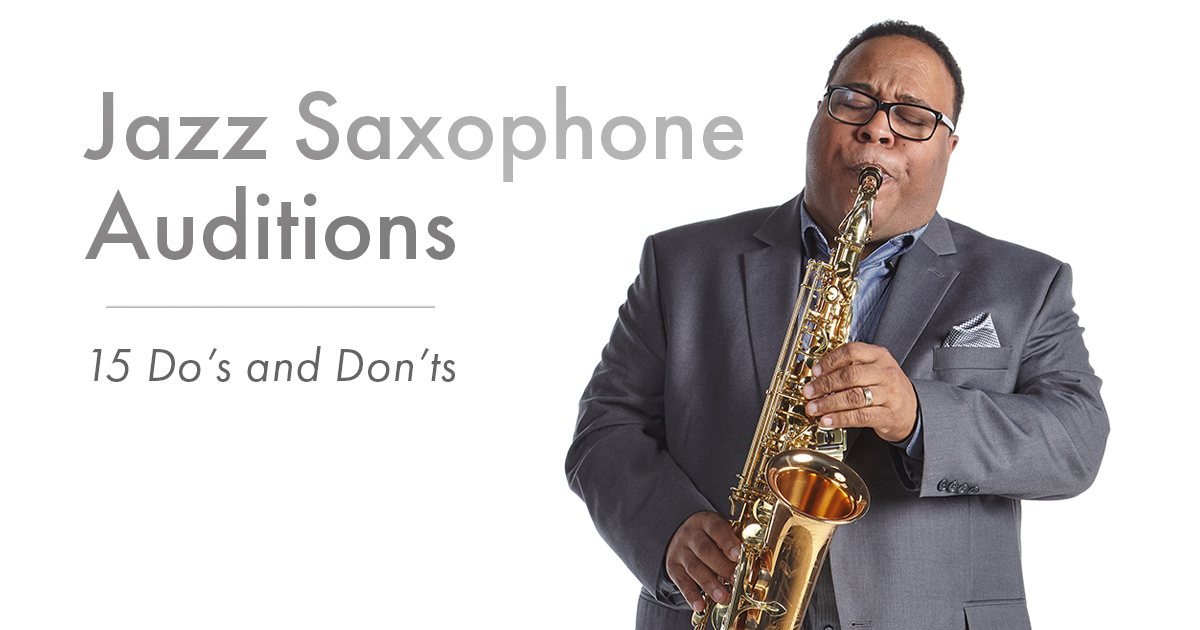The 15 Do's and Don'ts of Jazz Saxophone Auditions: Live, Video, Or Behind a Screen
by Bruce Williams
Date Posted: September 14, 2020

Bruce Williams is an Ensemble Coach at Juilliard Jazz and JazzHouse Kids
15 Do's and Don'ts
1. Scales
Play your scales as indicated in the audition requirements. Play the exact rhythm and form of the scale.
2. Keep a Consistent Tempo
Play your scales at a comfortable tempo and don't rush. Play all of them at the same desired tempo. Ex. 65-80bpm
3. Keep Technique Crisp
Be careful in choosing a tempo in order to not clip or make grace notes out of a part of the scale pattern because it sounds both sloppy and like you made a mistake. Learn to match your fingers with your tongue and use good pedagogical phrasing.
4. Clean Start to Scales
Be able to start your scales or lines with a clean legato tongue and note a breathe attack or overblown low notes. Support your sound.
5. Arpeggios
The above applies to playing arpeggios as well.
6. It Starts with the Melody
Play all melodies with conviction and a good full sound. Don't get too far away from the real melody.
7. Play to your Strengths
Improvisational excerpts should only display the best that you have to offer, an audition isn't the time to discover new avenues in your playing style or ability. Play to your strengths. When using play along materials or YouTube, please cue your music to avoid YouTube commercials being heard in audio and video examples.
"Play to your strengths." - Bruce Williams
8. Practice Singing Your Ballads
Think of singing through your instrument rather than operating it when expressing yourself when playing a ballad.
9. Seek Additional Help
Over prepare for your reading, sight reading, or big band excerpts. Ask for help and practice reading with a metronome often.
10. No Cramming
Review all materials for your auditions with a private teacher or coach as far ahead of time as possible. Cramming for an audition can be recognized by trained adjudicators or professional players.
11. Show Up On Time
This applies to live auditions: show up on time which means at least ten minutes early. Maybe ten minutes to a half hour early so that you can warm up and relax. Even more time if you think you need it is advised.
12. Have Your Own Music
Have your own personal copies of the audition materials in hand that are neat and clean.
13. Dress Like You're Going for an Interview
Dress the part. Look like you want to interview for a job and not play ball.
14. Speak Clearly
Speak and look directly in the direction of the camera and speak clearly. Always introduce yourself, grade, age, instrument, and the date.
15. Relax
Lastly. RELAX and have FUN. Auditions can be the best learning experience.

About Bruce Williams
Bruce Williams is a powerful young jazz saxophonist who hails from our nation's capital of Washington, D.C. He has made his presence known on the jazz scene by garnering critical attention with his own enthusiastically received CD releases - "Brotherhood" and "Altoicity" - issued on Savant Records. He's made an indelible impression as a sideman on over twenty other CD and video recordings. Bruce has performed, toured, and recorded with a long roster of jazz legends - Little Jimmy Scott, Frank Foster, The Lincoln Center Jazz Orchestra, Stanley Cowell, Louis Smith, Cecil Brooks III, The Count Basie Orchestra, The World Saxophone Quartet, Russell Gunn, Curtis Fuller, and Roy Hargrove to name a few. More on Bruce here.
To Keep on Your Radar
The Vandoren Emerging artist competition is open to any highly proficient saxophonist or clarinetist – in Jazz or Classical – between the age of 18 and 23. The winners are chosen by a committee of Vandoren performing artists. Each contestant will submit an audition recording featuring pieces from the required repertoire. The winners will visit Paris to meet representatives from Vandoren and participate in a number of activities. Visit VEA Competition.